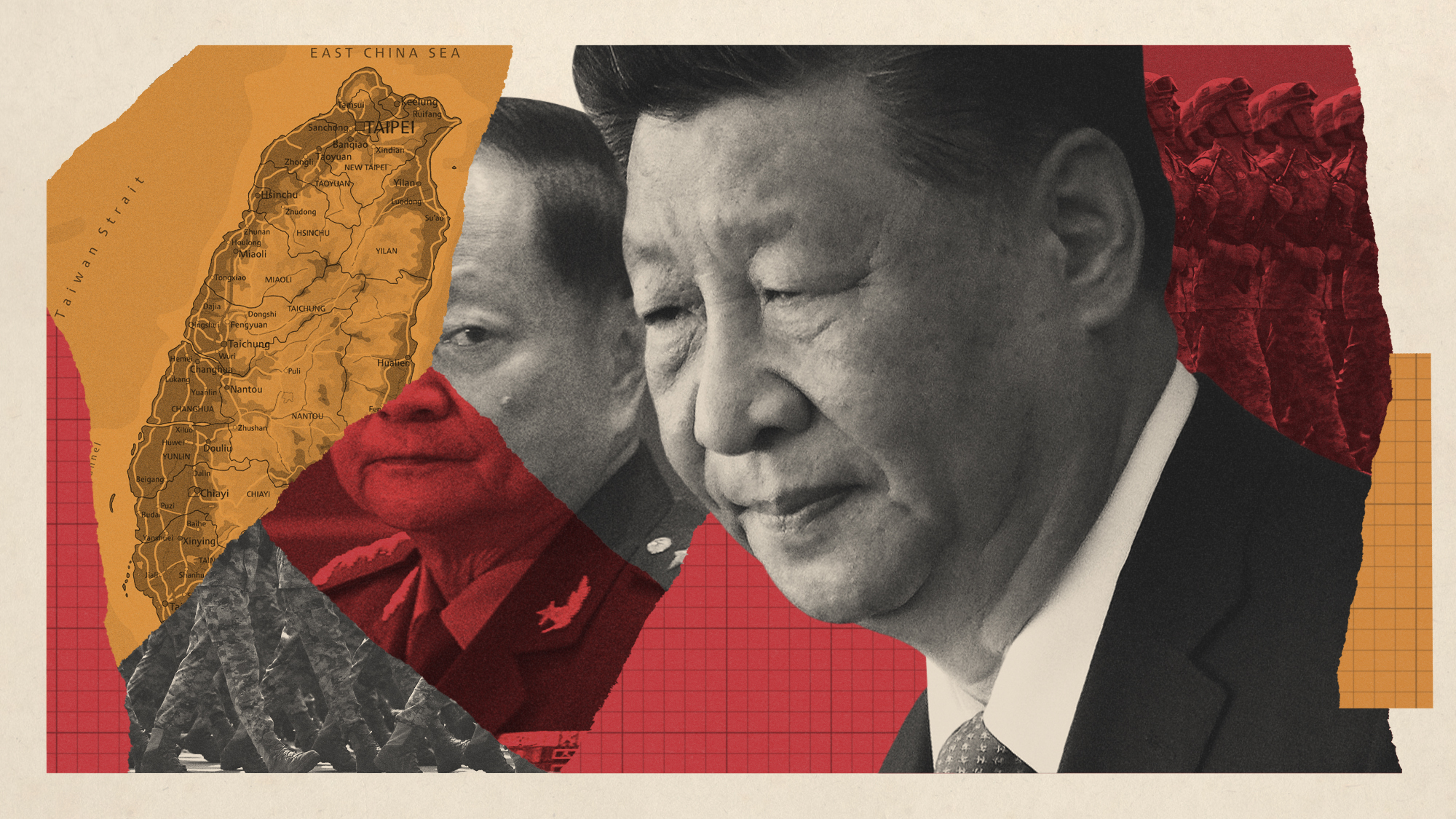Why stricter immigration laws help real refugees
Many asylum-seekers aren't fleeing persecution. That makes it harder to help those who are.


A free daily email with the biggest news stories of the day – and the best features from TheWeek.com
You are now subscribed
Your newsletter sign-up was successful
Uighurs are among the most persecuted people in the world. Ethnically Turkic, religiously Muslim, and geographically isolated, their distinctive culture has been the target of repression by the Chinese Communist Party (CCP) for decades. Some of the details remain unclear, but the consensus among human rights groups is that Uighurs are subject to intense surveillance, forced sterilization and abortion, and detention in large re-education camps. On the last day of the Trump administration, then-Secretary of State Mike Pompeo said these policies amount to genocide.
If anyone has a case for refugee status, then, it's Uighurs. So it's an unpleasant surprise that so few gain admission to the United States: On Wednesday, The Dispatch reported that not a single Uighur was granted entry in 2021. That's a shameful record for a country rightly proud of its reputation as a haven for religious freedom.
The U.S. isn't wholly to blame. As the Soviet Union did years ago, the CCP makes it very difficult for persecuted nationals to leave China. Doing so would be seen as an admission of guilt and would help expose the truth of conditions in Xinjiang territory, where most Uighurs live. But the Biden administration isn't doing all it can to help, either. According to The Dispatch, it hasn't given Uighurs priority status that would forward their claims more quickly through the immigration bureaucracy.
The Week
Escape your echo chamber. Get the facts behind the news, plus analysis from multiple perspectives.

Sign up for The Week's Free Newsletters
From our morning news briefing to a weekly Good News Newsletter, get the best of The Week delivered directly to your inbox.
From our morning news briefing to a weekly Good News Newsletter, get the best of The Week delivered directly to your inbox.
One reason for that lapse is the administration is busy trying to clean up messes it's made elsewhere. When it comes to refugees, that means dealing with more than 100,000 Afghans who were hastily evacuated during or after the recent U.S. withdrawal. The task isn't easy. Resettlement agencies report they're already overwhelmed, and tens of thousands of Afghans remain on military bases. After several high-profile cases of sexual assault, Republicans have also questioned whether the program includes adequate vetting.
Those challenges can probably be managed. The more serious problem is on the southern border, where up to 30,000 migrants (mostly Haitian) set up a tent city in Del Rio, Texas. That number isn't huge compared to the broader surge in border crossings since President Biden took office, but the optics, as they say, are bad. They make admission of more refugees, however deserving, politically unfeasible.
The administration blames economic and social instability in Latin America for this surge, while critics like my colleague Jim Antle point to Biden's campaign promises to reverse Trump-era restrictions. But a key detail of the present crisis reflects a deeper tension in America's immigration policy: Contrary to familiar rhetoric, many of the people who try to cross the border aren't classic illegal immigrants trying to evade detection. Instead, they're asylum seekers who surrender to authorities and petition for the legal right to remain.
In theory, asylum is an application of the same principle that justifies the admission of refugees. According to the United Nations' 1951 refugee convention and its 1967 Protocol, a refugee is anyone unwilling unable or unwilling to return to his or her home country due to past persecution or a well-founded fear of being persecuted in the future "on account of race, religion, nationality, membership in a particular social group, or political opinion." In the Refugee Act of 1980, Congress adopted this definition and established asylum as a means of requesting refugee status while already in the U.S. or at its borders.
A free daily email with the biggest news stories of the day – and the best features from TheWeek.com
The Refugee Act was a response to the consequences of another foreign policy misadventure. Then, Vietnamese and Cambodians attempted to enter the U.S. in numbers that far exceeded the legal cap on refugees. In addressing that problem, though, Congress created a new one. Current asylum laws were designed in a Cold War setting as a symbol of American freedom and a remedy for organized persecution by ideologically restrictive regimes. As those regimes disappeared and the category of persecution was stretched to include domestic violence and organized crime, it became a loophole in the immigration system. That has become irresistible for desperate people who aren't necessarily victims of political, religious, or ethnic repression.
Even their advocates admit most asylum seekers aren't fleeing persecution as the law defines it. In The New York Times, former Obama administration official Michael Posner argued the majority of Haitians encamped in Texas were "looking for a new home where they will find stability, better jobs, and more security than their own country can offer." Economic migration is understandable, but it's not what the asylum system was set up to accommodate.
To be clear, making an asylum claim is no guarantee of legal status. Some applicants are rejected immediately. Many others wait years for their cases to be resolved, and not necessarily in their favor. The fact of the backlog, though, acts as a perverse incentive. Even though they may wait for years only to lose their cases, bureaucratic inertia offers a good chance applicants will be able to establish residency in the United States while their cases are pending. In fact, nearly half of the migrants who flocked to Del Rio were allowed to remain in the U.S. Their strategy of camping out on the border worked.
In effect, then, if not intention, asylum serves as an incentive to disorder and an enticement to legal limbo. It's not a situation anyone would choose for itself, but it's still better than the poverty and chaos many migrants face at home. Apart from creating nightmarish enforcement problems, though, the blowback from borders overwhelmed with economic migrants seeking asylum they don't legally deserve makes it more difficult to assist groups truly facing targeted violence from their own governments. That very much includes the Uighurs.
There are a number of proposals for rationalizing the asylum system. Just this week, the administration abandoned Biden's campaign promises and restored the "Remain in Mexico" policy, which requires asylum seekers to apply from the other side of the border. It's a tacit acknowledgement that open borders, which many progressives and libertarians favor, is a non-starter.
Yet few commentators have acknowledged a genuine tradeoff between assisting refugees in the older and stricter sense of the term and the broad conception of asylum that's become its rival. With insatiable demand for entry to the United States, limited resources for enforcement, and public opinion divided to the point of incoherence, trying to help everyone everywhere is not only impossible; it's also likely to inflame resentment of immigrants who are already here.
Responsible politics is about setting priorities. The Uighurs and others in their position should be at the top of the list to come to the United States even if that means others must be turned away.
Samuel Goldman is a national correspondent at TheWeek.com. He is also an associate professor of political science at George Washington University, where he is executive director of the John L. Loeb, Jr. Institute for Religious Freedom and director of the Politics & Values Program. He received his Ph.D. from Harvard and was a postdoctoral fellow in Religion, Ethics, & Politics at Princeton University. His books include God's Country: Christian Zionism in America (University of Pennsylvania Press, 2018) and After Nationalism (University of Pennsylvania Press, 2021). In addition to academic research, Goldman's writing has appeared in The New York Times, The Wall Street Journal, and many other publications.
-
 What are the best investments for beginners?
What are the best investments for beginners?The Explainer Stocks and ETFs and bonds, oh my
-
 What to know before filing your own taxes for the first time
What to know before filing your own taxes for the first timethe explainer Tackle this financial milestone with confidence
-
 The biggest box office flops of the 21st century
The biggest box office flops of the 21st centuryin depth Unnecessary remakes and turgid, expensive CGI-fests highlight this list of these most notorious box-office losers
-
 ICE eyes new targets post-Minnesota retreat
ICE eyes new targets post-Minnesota retreatIn the Spotlight Several cities are reportedly on ICE’s list for immigration crackdowns
-
 How did ‘wine moms’ become the face of anti-ICE protests?
How did ‘wine moms’ become the face of anti-ICE protests?Today’s Big Question Women lead the resistance to Trump’s deportations
-
 The UK expands its Hong Kong visa scheme
The UK expands its Hong Kong visa schemeThe Explainer Around 26,000 additional arrivals expected in the UK as government widens eligibility in response to crackdown on rights in former colony
-
 ‘Hong Kong is stable because it has been muzzled’
‘Hong Kong is stable because it has been muzzled’Instant Opinion Opinion, comment and editorials of the day
-
 How are Democrats trying to reform ICE?
How are Democrats trying to reform ICE?Today’s Big Question Democratic leadership has put forth several demands for the agency
-
 Minnesota’s legal system buckles under Trump’s ICE surge
Minnesota’s legal system buckles under Trump’s ICE surgeIN THE SPOTLIGHT Mass arrests and chaotic administration have pushed Twin Cities courts to the brink as lawyers and judges alike struggle to keep pace with ICE’s activity
-
 700 ICE agents exit Twin Cities amid legal chaos
700 ICE agents exit Twin Cities amid legal chaosSpeed Read More than 2,000 agents remain in the region
-
 What do Xi’s military purges mean for Taiwan?
What do Xi’s military purges mean for Taiwan?Today’s Big Question Analysts say China’s leader is still focused on reunification
